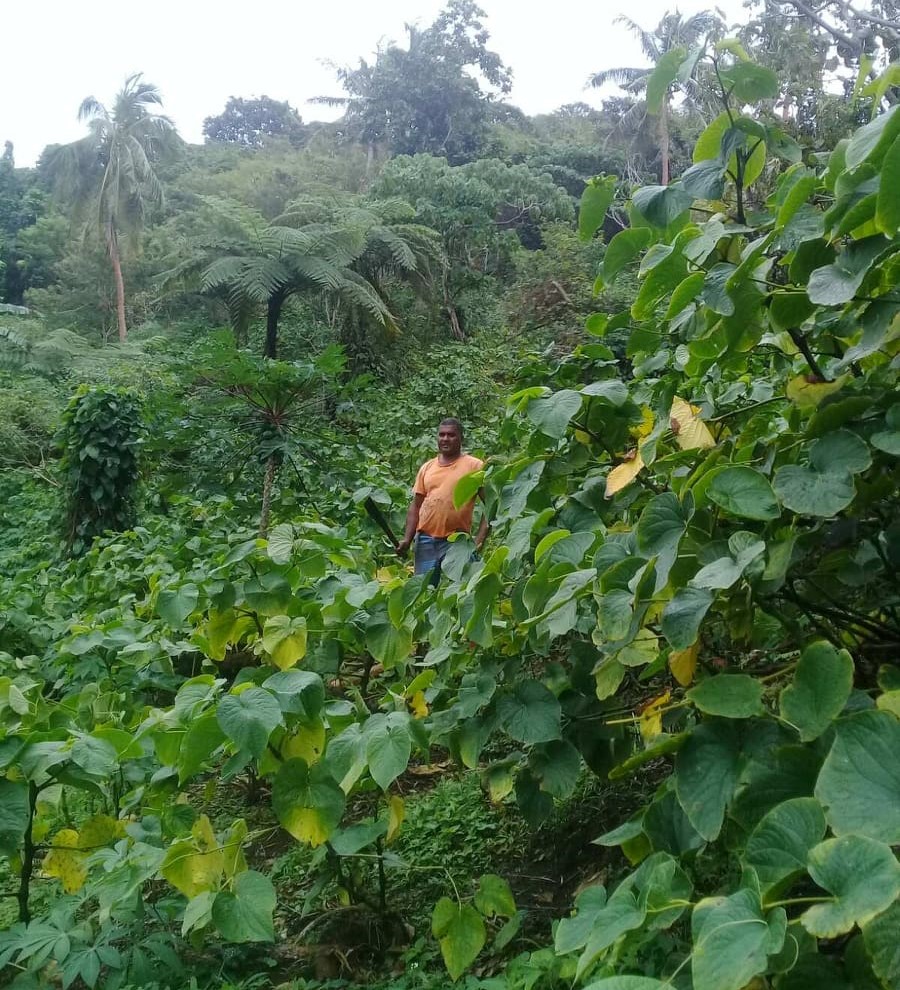Hard work is key, says Motoriki farmer

Picture : Farmer Mesake in his yaqona plantation
Different farmers live by different principles that have allowed them to achieve their dreams of improving their livelihoods and thrive overall as successful agriculture entrepreneurs.
Most set practical goals such as providing a better education for their children, build homes, or improve existing ones, or buy vehicles or fibreglass boats to assist in carting their produce from point A to point B, and of course take care of their vanua and lotu obligations.
In the interviews I have conducted with farmers in the short span of time I have worked in the Ministry of Agriculture, the above reasons have stood out as to what drives them to toil the land. These are also, more or less, the same reasons why those of us in the formal sector find work.
Then there is the odd one out, who stands out for all the right reasons. Motoriki farmer, Mesake Vuki, 47yrs, is such a one.
He attended a Plant Health Clinic in Levuka on Friday (18.9.20) because he discovered a disease affecting his yaqona plants and thought to seek the advice of agriculture officers who were attending a weeklong training there.
Speaking in itaukei, he said, even before coming to the clinic he had a fair idea how to address this issue given his farming experience. But came anyway for a proper diagnosis and solution.
What made him stand out, was his principle of working without seeking assistance.
He explained his humble beginnings and working hard on his yaqona farm made him realize this principle. Instead, he said, if one had two capable hands, land to plant, and a commitment to not give up; then that was all one needed.
Everyone has a story and for Mesake; his is quite modest and empowering. Raised by his grandmother, after losing his parents whilst still an infant, he was forced to drop out of school at the age of 13 due to financial difficulties.
And that pain, he shared was, at that time, unbearable as he was still interested in being educated. Thus, it took him years’ to get over. He started farming, as per his grandmother’s advice, but again the interest was not there. It was only in 2015 that he took farming seriously and the things he has been able to accomplish were nothing short of sheer dedication.
When he first settled down, the house he built was a Fijian Bure. Times were extremely difficult that at one point, even salt was a luxury. He and his wife survived on whatever he was able to catch while fishing and selling that at either Suva or Nausori markets just to make ends meet. There were many challenges he and his family faced in trying to secure a steady income before he turned to farming.
He persevered, slow and sure. His farming took off and he managed to build a more permanent home. Then Winston happened and destroyed that newly built structure, wiping out all he had built including his canteen that he just re-stocked with supplies.
Yet in a matter of weeks Mesake was rebuilding his home and canteen. Whilst he profusely refuses any form of assistance, it was nevertheless offered in the form of a drier for his yaqona plants by the Ministry of Agriculture in 2019. That help has indeed made his work easier and faster allowing him to dry out more plants and having it ready for his markets in a shorter amount of time. He uses it full time, boosting his energy levels making him re-double his efforts thus increasing his plant production. That has been the only assistance he has ever had and vows it will remain that way.
He developed a habit of keeping a diary, recording the time he spent out on this yaqona farm. Mesake realized that the amount of hours one clocked working for someone else, that time could also be spent on one’s land. And so he strictly maintained the routine, sometimes toiling 12 to 16 hours a day working, which he did not mind one bit at all.
His farming practice included never using fertilizer. He had tried planting other crops but realized that none of the crops fetched the same value at harvest time as well as it was easier to transport compared to other crops. Today, he has 3000 yaqona plants in the ground at varying stages of maturity with markets in Suva, Nausori and Levuka. Through his yaqona farm he sent his only child to the British Army.
Sometimes, he reminisces his early days when life was a struggle. He says, in those days; when each day felt like a never-ending struggle; never once did it cross his mind sometime in the future he would own a proper permanent home, let alone run a canteen as well.
Today, Mesake has invested in shares along with savings in the bank, is content with life and continues to live by his philosophy of hard work without seeking help.
-ENDS-
